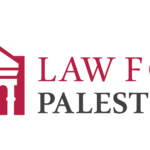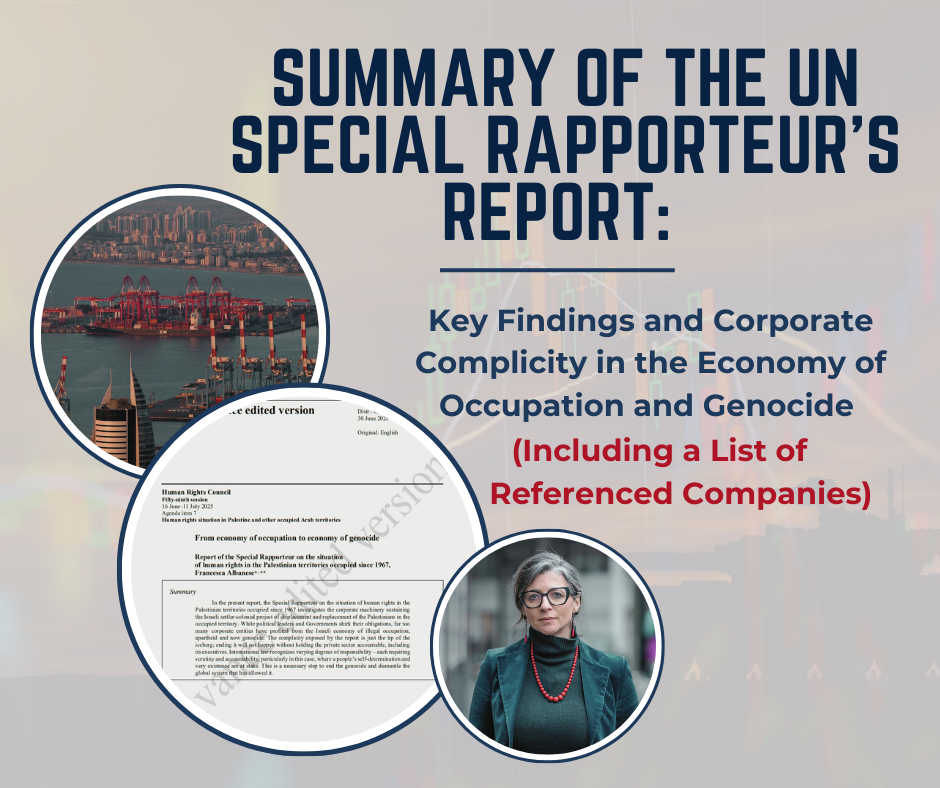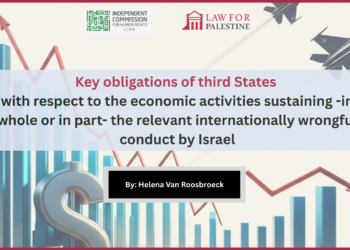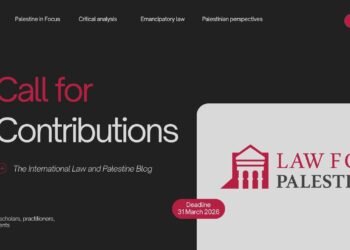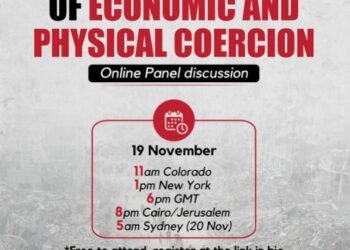Summary of the UN Special Rapporteur’s Report on Corporate Complicity in the Economy of Occupation and Genocide
(Including a List of Referenced Companies)
Prepared by: Henriette Willberg and Zac Collins-Widders
* Click here to read or download this material in PDF format
Overview
Francesca Albanese, the UN Special Rapporteur on the situation of human rights in the Palestinian territory occupied since 1967, has presented her most recent report to the Human Rights Council in July 2025. The report, From economy of occupation to economy of genocide, focuses attention to the role of corporations in sustaining and profiting from Israel’s settler-colonial project in the Occupied Palestinian Territory (OPT) and its ongoing genocidal campaign in Gaza.
The economy of settler-colonial occupation and the economy of genocide are deeply entwined. The report documents the critical role that corporations have played in driving Israel’s settler-colonial erasure of the Palestinian people from their land, contributing to a process of displacement and replacement and profiting from decades of human rights violations and international crimes. In this “displacement-replacement economy of occupation,” the same corporations that facilitate the destruction of Palestinian land and infrastructure are involved in building and profiting from the colonial agricultural, infrastructure and enterprises that replace it.
The Special Rapporteur’s key finding, however, lies in the transformation she has documented since October 2023, whereby these “long-standing systems of control, exploitation and dispossession” have developed into structures “mobilized to inflict mass violence and immense destruction” (para 26). Corporate entities operating within the economy of settler-colonial occupation, engaging in “a mode of domination known as “colonial racial capitalism”” are now enabling, financing and profiting from an economy of genocide. Additionally, they “enable the denial of self-determination and other structural violations in the occupied Palestinian territory, including occupation, annexation and crimes of apartheid and genocide, as well as a long list of ancillary crimes and human rights violations, from discrimination, wanton destruction, forced displacement and pillage to extrajudicial killing and starvation” (para 2).
In order to illustrate the different facets of this economy of genocide, the Special Rapporteur’s report examines in turn the contribution of corporations in the displacement of Palestinians, their replacement and, finally, in enabling genocide. The report focuses on eight key sectors which have been instrumental to the settler-colonial economy and its genocidal transformation: military including weapons manufacturers; surveillance and carcerality; heavy machinery; construction; natural resources including water, electricity, gas, and fuels; trade, including agribusiness, global retail, and occupation tourism; finance; and knowledge production.
In addition to over 45 corporate entities named in the Special Rapporteur’s report (see table below), the Special Rapporteur has developed a database of 1000 companies, mapping implicated companies across the world (para 8).
Legal context and framework
Before diving into the factual evidence of corporate involvement in the economy of genocide, the Special Rapporteur sets out the legal framework governing corporate responsibility. This is further complemented by an in-depth annex which provides additional legal context . The report acknowledges that the obligations of corporations are not commensurate with the political and economic power they frequently wield, and “the asymmetry of immense power without sufficiently justiciable accountability exposes a fundamental global governance gap” (para 12). Nevertheless, the report identifies as important the precedents arising from the post-holocaust industrialists’ trials, the Truth and Reconciliation Commission of South Africa as well as domestic and international litigation (para 14).
The UN Guiding Principles on Business and Human Rights (UNGPs) provide a normative framework for the obligations of States and corporate entities under international law. States are obligated under this framework to prevent, investigate, punish, and remedy human rights abuses by third parties (para 16). The responsibilities of corporations, on the other hand, depend on whether an entity causes, contributes to, or is directly linked with adverse human rights impacts (para 17). The normative framework outlined by the UNGPs requires corporate entities to ensure that their business activities do not implicate them in human rights violations. This is achieved by undertaking human rights due diligence to identify risks and adjusting conduct where required. Crucially, due diligence alone does not absolve a corporation of liability: it is the material impact of a corporation’s actions that matters (para 14).
When operating in conflict affected areas, corporations must observe heightened human rights due diligence. In the report’s annex, the Special Rapporteur sets out three questions which corporate entities must address (Annex 1, para 11):
- Is there an actual or potential adverse impact on human rights or is the conflict connected either to the corporate entity’s activities, products or services?
- If so, do the corporate entity’s activities increase the risk of that impact?
- If so, would the corporate entity’s activities in and of themselves be sufficient to result in that impact?
The result of this analysis gives rise to particular legal responsibilities (Annex 1, para 13), A corporation that answers ‘yes’ to all three questions causes human rights violations and has a responsibility to cease its actions and to provide remedies and reparations for harm caused. A corporation that answers ‘yes’ to (a) and (b) contributes to human rights violations and must take necessary steps to cease or prevent this contribution, to mitigate further impact through its leverage and to cooperate in remediation. Finally, where a corporation answers ‘yes’ to (a) alone, it is directly linked to human rights violations and must use its leverage to prevent or mitigate the impact on human rights, terminating relationships where this proves ineffective.
Annex 1 of the report also sets out the circumstances in which failure of a corporate entity to act in line with international law may give rise to criminal liability of both corporate executives and, increasingly, corporations themselves (paras 17-29). The Special Rapporteur outlines the requirements for finding different modes of liability (paras 20-21) as well as mechanisms of enforcement, especially at the domestic and regional levels (paras 22-29).
In applying this framework to the OPT, the Special Rapporteur asserts that corporate entities “have been on notice for decades” about the widespread and systematic human rights violations, which would have been identified by proper human rights due diligence (Annex 1, para 30). She outlines key actors and reports which have documented and exposed an “inherently unlawful context” and the economic structures behind it (Annex 1, paras 31-34).
The report and its annex also present recent judicial developments as strong confirmation that corporate activities “with any component of the occupation” are connected to violations of peremptory norms and international crimes (para 18). This includes the ICJ’s July 2024 Advisory Opinion, where the Court made a determination of racial segregation and apartheid, violations of the right to self-determination and the prohibition on the use of force, and affirmed the illegality of Israel’s presence in the Occupied Palestinian Territory. The Special Rapporteur also references the ongoing proceedings for genocide before the ICJ and for war crimes and crimes against humanity before the ICC (para 18).
The Special Rapporteur concludes that a result of these decisions is a prima facie responsibility for corporate entities “not to engage and/or to withdraw totally and unconditionally from any associated dealings, and to ensure that any engagement with Palestinians enables their self-determination” (para 19). Corporate entities maintaining activities and relationships with Israel “may be found to have knowingly contributed to” violations of peremptory norms and international crimes (para 20).
From the economy of settler-colonial occupation to the economy of genocide
The report first articulates that “[s]ettler-colonialism involves extraction and profit from, and colonization of, land through the expulsion of its owners” and then reviews the critical role of corporations in the settler-colonial erasure of the Palestinian people from their land. Corporations have materially contributed to Palestinian dispossession and displacement (para 23), have profited from the exploitation of Palestinian labour and resources whilst “stifling the Palestinian economy” (para 24), and have ensured that money keeps on flowing into the illegal occupation (para 25).
Against the backdrop of this corporate machinery profiting from and entrenching the occupation, the Special Rapporteur documents a shift following October 2023 whereby these “long-standing systems of control, exploitation and dispossession” have developed into structures “mobilized to inflict mass violence and immense destruction” (para 26). Entities operating within the economy of settler-colonial occupation are now enabling and profiting from an economy of genocide.
In order to illustrate the different facets of this economy of genocide, the Special Rapporteur’s report examines the contribution of corporations in the displacement of Palestinians, their replacement and, finally, in enabling genocide, with a focus on eight key sectors which have been instrumental to the settler-colonial economy and its genocidal transformation.
A. Displacement
Starting with displacement, the report sets out the ways in which weapons and industrial technologies, surveillance and incarceration technologies, and heavy machinery and equipment essential to Israel’s settler-colonial occupation and apartheid have been used, since October 2023, as tools for Israel’s genocidal campaign against the Palestinians (para 28).
The report underscores that “militarized violence created the State of Israel and remains the engine of its settler-colonial project” (para 29), becoming its “economic backbone” (para 30). Israel’s Elbit Systems and state-owned Israel Aerospace Industries (IAI) rank among the top 50 weapons manufacturers and have provided an essential supply of weaponry and strengthened Israel’s position as a key global arms exporter (para 31). Particular attention is given to the international partnership for the F-35 fighter jet (para 32). Over 1,650 companies and eight states are part of a procurement programme which equips Israel with “unprecedented aerial power,” which has since October 2023, allowed Israel to drop 85,000 tons of bombs on Gaza, causing unfathomable destruction and killing vast numbers of Palestinians (para 32). Israeli military corporations have developed significant collaborations with international institutions such as Massachusetts Institute of Technology for the development of military technology, including automated weapons systems for drones (para 33).
The report also acknowledges the vast infrastructure and actors which surround the military sector, supporting the export and import of weapons, related transactions, complex supply chains, legal and financial services, dealers and agents as well as shipping companies (para 34). Genocide has been a lucrative venture for Israeli arms suppliers as well as foreign arms companies worldwide who have profited from Israel’s surge in military spending (para 35).
The report then moves to look at the role of Israel’s tech sector in providing infrastructure for the surveillance and incarceration of Palestinians. Israel’s claims of security needs have given rise to a “start-up nation”, a booming industry which has led to “unparalleled developments in carceral and surveillance services” and companies “profiting from the unique testing ground for military technology offered by the occupied Palestinian territory” (para 36). Many of these Israeli tech firms have strong links to military infrastructure and are developed by ex-servicemen, including NSO Group whose Pegasus spyware has been used to target Palestinian activists (para 37). Tech companies such as IBM Israel and Hewlett Packard Enterprises have provided essential technological infrastructure used to enable Israel’s discriminatory apartheid systems including for mass data collection, in prisons and for the police (para 38). IBM, for example, has trained military and intelligence personnel and operates a central Israeli database for collecting and storing biometric data on Palestinians (para 38).
Companies such as Microsoft, Google and Amazon provide systems for the Israeli military, police and prison service (para 40) as well as critical cloud and AI infrastructure (para 41). AI systems developed by the Israeli military have reshaped modern warfare with the help of companies like Palantir Technologies Inc., which expanded its support of the Israeli military following October 2023 and whose technologies have likely been used to facilitate unlawful use of force against Palestinians with executive-level knowledge and purpose (para 42).
Thirdly, the report examines the role of corporate actors in providing civilian heavy machinery, which has long been used for the demolition of Palestinian homes, infrastructure and the exploitation of Palestinian resources. Since October 2023, this heavy machinery has been deployed in Gaza where it has been used to destroy 70 per cent of structures and 81 per cent of agricultural cropland (para 44). Manufacturers such as Caterpillar, Hyundai, and Volvo have supplied Israel with heavy machinery which, since October 2023, has been used in Gaza to destroy homes, mosques, and infrastructure essential for sustaining life (paras 45-6).
B. Replacement
The Special Rapporteur next traces the role of corporate actors in sustaining and profiting from the settlement enterprise, which replaces Palestinian life with colonies and their infrastructure (para 48). Since October 2023, this settlement enterprise has created conditions of life calculated to destroy the Palestinian people.
The report first examines the rapid growth of new colonies and outposts since October 2023, supported by the construction industry, which provides essential “machinery, raw materials and logistical support” (para 49). For example, the Special Rapporteur reports how German company Heidelberg Materials AG, through its subsidiary Hanson Israel, has contributed to plundering raw materials from the Nahal Raba quarry in the West Bank, which are used for the construction of colonies (para 50). Other companies are involved in the construction of transport infrastructure such as roads and tramlines, which expand the colonies and entrench Israel’s apartheid system (para 51). Real estate companies sell properties in the colonies, developing and marketing thousands of apartments in the Occupied Palestinian Territory to Israelis and international buyers (para 52).
The Special Rapporteur then turns to the systematic control Israel holds over Palestinian natural resources, most critically water and energy. She documents how the “complete siege” on Gaza, imposed on 9 October 2023, involved the immediate cutoff of water, electricity, and fuel -all of which are controlled by the Israeli occupation authorities- as part of an “engineered dependency” that “was operationalised for genocide” (para 54). The Special Rapporteur argues that the near complete restriction of these critical supplies has contributed to Israel’s genocidal campaign through a deliberate creation of conditions of life calculated to bring about the destruction of Palestinians as a group (para 54).
Israel controls access to water in the Occupied Palestinian Territory, forcing Palestinians to purchase water sourced from their own territory at high costs through the Israeli national water company, Mekorot, which maintains its monopoly over water in the OPT (para 55). The Special Rapporteur analyses how this system of supply of water has been transformed into a “tool of genocide”, notably in the first six months following October 2023 when Mekorot only ran its Gaza pipelines at 22 per cent of capacity (para 55).
Israel has integrated the colonies in the West Bank into its energy infrastructure while controlling the flow of energy to Palestinians. The Special Rapporteur records that, since October 2023, Israel has cut energy to most of Gaza, threatening the collapse of water pumps, hospitals, and transport (para 56). Corporations such as US-based Drummed Company and Swiss-based Glencore PLC facilitate the shipment of coal from Colombia and South Africa for Israel’s electricity, whilst US Chevron Corporation extracts natural gas from Leviathan and Tamar gas fields (paras 57-58). Conglomerates BP and Chevron contribute significantly to Israeli imports of crude oil, which is refined in Israel before being distributed to petrol stations in Israel and the occupied Palestinian territory or supplied as jet fuel to the Israeli Air Force (para 59). Corporations supplying Israel with energy contribute to infrastructure that not only entrenches Israel’s illegal annexation but also feeds its energy-intensive genocide in Gaza.
The final focus of the section on replacement concerns commerce flowing from agribusiness, global retail, and tourism respectively. The activities of corporate entities have contributed to the erasure of Palestinian food systems whilst entrenching dependency on Israeli agribusiness. Companies source products from agricultural outposts in the colonies and also benefit from a captive Palestinian market (para 62). Israeli agricultural expansion in the Occupied Palestinian Territory is further supported by developments in agritech, such as drip irrigation technology provided by Netafim which enables colonies to exploit water and land, depleting Palestinian natural resources and out-competing Palestinian farmers (para 63).
In the retail market, companies mask the origin of products from the colonies through misleading labels and mixing supply-chains (para 65). The report details the role of global logistics giants such as Maersk in supplying global markets with these products (para 66), and the lack of distinction made between products from Israel and those from its colonies (para 67). Additionally, even in markets such as the European Union, goods from the colonies are allowed on the market with no distinction despite regulations requiring it “and the responsibility is put on uninformed consumers. Given the illegality of the colonies under international law, these products should not be traded at all” (para 67).
Finally, corporate entities have profited from occupation tourism, sustaining the colonies through the provision of properties and hotels. The Special Rapporteur explores how companies such as Airbnb and booking.com list properties in settlements built on occupied Palestinian land, expanding their “colonial profiteering” and whitewashing settler violence (paras 70-71).
C. Enablers Corporate Complicity Economy Occupation
In the third section, the Special Rapporteur’s report examines sectors which have sustained Israel’s settler-colonial occupation whilst profiting from and normalising the economy of genocide (para 72). While the report identifies financial, research, legal, consulting, media and advertising firms as some of the key enablers, this section focuses on the financial and academic sectors (para 72).
A central part of this section concerns the finance industry, where the Special Rapporteur builds on the work of Palestinian civil society organisations who have long documented the channels of money into the colonies. A critical component of this sector are the treasury bonds, which have served as a primary source of finance for the Israeli state budget and helped fund Israel’s dramatic increase in military spending (para 74). Banks such as BNP Paribas and Barclays underwrote the bonds, boosting market confidence, and 400 investors from 36 countries purchased them (para 74). Institutional investors such as Blackrock and Vanguard have channelled billions of dollars into bonds as well as companies with direct involvement in the Israeli occupation and genocide (para 75). Global insurance companies such as Allianz and AXA invest heavily in companies involved in the occupation and genocide, while also providing insurance services that ‘de-risk’ the operational environment for other companies (para 76).
The financial sector also provides the weapons industry with crucial access to funds through loans and underwriting services. Companies providing financial advisory services have chosen not to consider human rights violations in the occupied Palestinian territories in their environmental, social and governance (ESG) assessments, allowing companies to remain ‘compliant’ despite being connected to violations. The report outlines how “this entire environment has facilitated a record 179 per cent increase in United States dollar-equivalent equity prices of the companies listed in the Tel Aviv stock exchange since the start of the assault on Gaza, translating into a $157.9 billion gain” (para 80).
The Special Rapporteur also casts light on faith-based charities, an overlooked source of finance for settler expansion and projects linked to the Israeli military (para 81).
For the final section, the Special Rapporteur turns to the role of research and academic institutions in enabling and legitimising violations of Palestinian rights. She finds that universities in Israel, especially law schools, archaeology and Middle Eastern studies departments, contribute to the “ideological scaffolding of apartheid, cultivating State-aligned narratives, erasing Palestinian history and justifying occupation practices” (para 82). Universities have served as incubators for technology and equipment used by the Israeli military, often developed in collaborations with the Israeli military and arms contractors (para 82).
Foreign universities, largely from the global minority countries, such as MIT, have partnered with Israeli institutions to conduct research into weapons and surveillance tools, funded by the Israeli Ministry of Defence (para 83). Additionally, the European Commission’s Horizon Europe programme has funded Israeli entities which are complicit in apartheid and genocide, including the Ministry of Defense (para 84) and universities working in collaboration with Israel military and tech firms. The Technical University of Munich, for example, has projects with Israeli firms on military technology, cloud and artificial intelligence systems as well as urban mobility which entrenches annexation in Jerusalem (para 84).
Conclusions
The Special Rapporteur concludes that Israel’s genocide continues due to its profitability. The occupied Palestinian territory as a “forever-occupation” has become “the ideal testing ground for arms manufacturers and big tech”, bringing in huge rewards for investors with no accountability and limited oversight (para 87).
A large international corporate machinery has propped up the Israeli economy, providing investment and insurance that has financed devastation and channeled wealth into Israel’s genocidal economy. Whether in the arms, construction or extractive energy sector, companies have reaped profits whilst equipping Israel with weaponry, machinery, and fuel used to commit genocide against the Palestinian people.
Alongside this genocide, the Special Rapporteur concludes that a “process of violent annexation” has continued in the West Bank, including East Jerusalem, entrenched by agribusiness, online tourism, retail and academia which not only profit from the occupation economy “now operating in genocidal mode”, but are “structurally dependent on settler-colonial collaborations” (para 90).
The report concludes that the corporate machinery which drives forward this economy of genocide should be understood as a “joint criminal enterprise”, whereby the activities of one corporation contribute to a whole economy that “drives, supplies and enables this genocide” (para 91). The Special Rapporteur argues that corporate relations with Israel must be halted until the occupation and apartheid have been dismantled – as ordered by the ICJ – and reparations have been made.
Recommendations
The Special Rapporteur finishes the report with a number of key recommendations for UN Member States, corporate entities, the ICC and national judiciaries, and the UN (para 94).
She urges Member States to impose sanctions and a full arms embargo on Israel, to suspend or prevent trade and investment relations, to impose sanctions on entities and individuals, and to enforce accountability for corporate entities.
She urges corporate entities to cease all business activities directly linked with, contributing to and causing human rights violations and international crimes and to pay reparations to the Palestinian people.
She urges the ICC and national judiciaries to investigate and prosecute corporate entities and/or their executives for their involvement in the commission of international crimes.
She urges the UN to comply with the ICJ’s July 2024 Advisory Opinion and to expand the OHCHR database to include all entities involved in Israeli unlawful occupation.
Finally, the Special Rapporteur calls for increased pressure to enforce boycotts, divestments and sanctions, alongside efforts to secure justice and accountability for Palestine at the international and domestic levels. This includes pursuing diplomatic, economic and legal actions against actors who have sustained and profited from the economies of occupation and genocide. Corporate Complicity Economy Occupation
* Download the list of companies referenced in the Special Rapporteur’s report – click here
* Click here to read the full report (in English)

